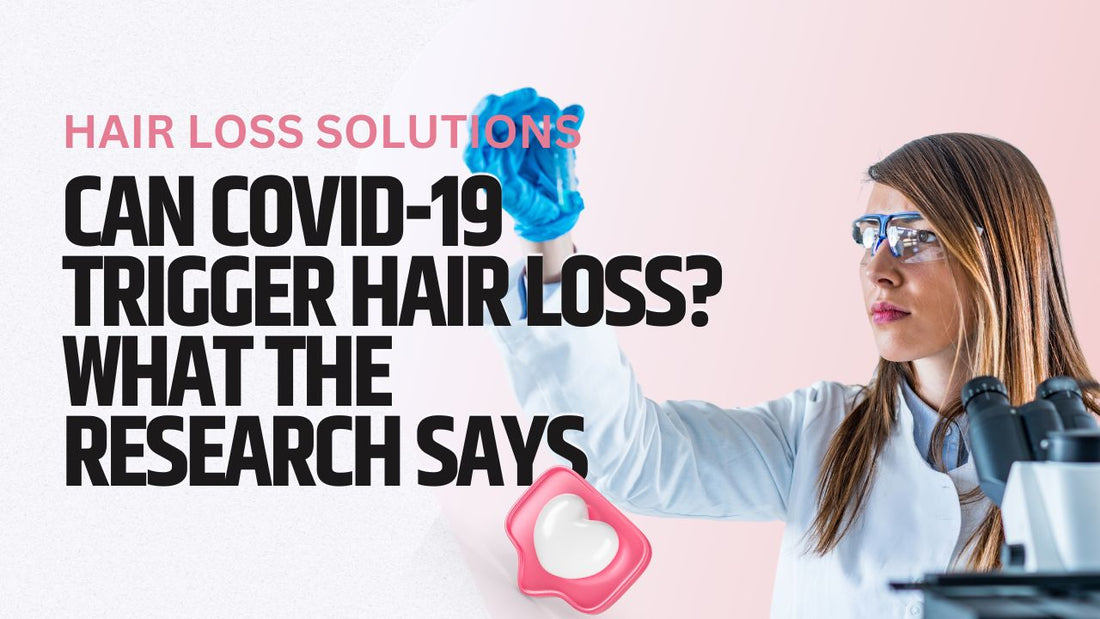
Can COVID-19 Trigger Hair Loss? What the Research Says
Share
Understanding COVID-19
What is COVID-19?
COVID-19, caused by the SARS-CoV-2 virus, first emerged in Wuhan, China, in late 2019 and quickly evolved into a global pandemic. While primarily a respiratory illness, COVID-19 has shown to affect various systems of the body.
Known Symptoms of COVID-19
The common symptoms include fever, cough, and loss of taste or smell. However, as the pandemic progressed, an array of less common symptoms became apparent, including hair loss, which we will explore in depth in this article.

Setting the Context: Hair Loss in General
What Causes Hair Loss?
Hair loss is a common issue affecting millions of men and women worldwide. While genetics plays a crucial role, other factors like stress, hormonal imbalance, and lifestyle choices also contribute.
Types of Hair Loss
There are various types of hair loss, including androgenetic alopecia, telogen effluvium, and alopecia areata. Understanding the type of hair loss you're experiencing can be vital in seeking appropriate treatment.

Is There a Connection Between COVID-19 and Hair Loss?
Anecdotal Reports
Shortly after the outbreak, several anecdotal reports started surfacing from COVID-19 survivors experiencing hair loss. Many people took to social media to share their stories, prompting healthcare professionals to look into the issue.
What Does Preliminary Research Say?
Early research studies have started to establish a potential link between COVID-19 and hair loss. Stress associated with the illness, along with other physiological impacts of the virus, may lead to temporary hair loss conditions like telogen effluvium.
By understanding the general context of COVID-19 and how it potentially relates to hair loss, you are better equipped to take proactive steps in managing this issue. In the upcoming sections, we will delve deeper into scientific findings, explore expert opinions, and discuss potential treatment avenues including the role of Proactive Rosemary Hair Booster Oil. Stay tuned.

The Scientific Perspective: COVID-19 and Hair Loss
Current Studies and Findings
As the situation with COVID-19 continues to evolve, so does our understanding of its effects on the human body. Recent studies have shown that certain proteins affected by the virus may also be involved in the hair growth cycle, although more research is needed for definitive conclusions.
The Physiological Impact of COVID-19
One theory suggests that the stress and trauma of battling a severe viral infection can send hair follicles into a 'resting' phase, leading to increased hair shedding weeks or even months after recovery. This condition, known as telogen effluvium, is often temporary but can be distressing for those who experience it.

Expert Opinions
What Dermatologists Say
Leading dermatologists weigh in on the connection between COVID-19 and hair loss. Most agree that while the correlation isn't definitively proven, the number of cases reported warrants further investigation.
Advice from Trichologists
Experts specializing in the science of the hair and scalp—trichologists—also offer their perspective. They recommend closely monitoring symptoms and seeking professional guidance for targeted treatment plans.

Treatment Options for COVID-19-Induced Hair Loss
Conventional Treatments
Conventional treatments for hair loss, such as minoxidil or finasteride, can be an option, although they are usually more effective for genetic types of hair loss.
Natural Remedies
Natural remedies like biotin supplements and topical oils are increasingly gaining popularity for their minimal side effects and holistic approach.
Spotlight: Proactive Rosemary Hair Booster Oil
Ingredient List
The Proactive Rosemary Hair Booster Oil stands out as a multi-faceted solution for thinning hair. Its specially formulated blend combines Grape Seed Oil, Castor Seed Oil, and Rosemary Leaf Oil in a unique, clinically proven ratio.
Ease of Use
What sets this oil apart is its unparalleled ease of use. You can effortlessly add it to your shampoo, streamlining the application process.
Why It Stands Out
This product is pre-mixed in clinically proven proportions, eliminating the need for any dilution. This saves you both time and effort and removes the guesswork often involved in creating an effective hair treatment at home.
Research Supporting Its Efficacy
Each ingredient in this proprietary blend has its own set of research-backed benefits. This makes the Proactive Rosemary Hair Booster Oil a robust and reliable option for those dealing with hair loss post-COVID-19 or otherwise.
Summing Up: Navigating Hair Loss in the Age of COVID-19
Hair loss is a complex issue with a multitude of contributing factors. While the connection between COVID-19 and hair loss is still under research, the existing evidence and expert opinions suggest that the phenomenon can't be ignored.
Key Takeaways
- Emerging Evidence: While not conclusive, studies indicate a potential link between COVID-19 and hair loss.
- Seek Professional Help: Consult dermatologists and trichologists for a diagnosis and treatment plan tailored to your condition.
- Holistic Approaches: Consider both conventional and natural remedies, and remember that treatment efficacy varies from person to person.
Practical Tips for Managing Hair Loss Post-COVID
Maintain a Balanced Diet
Good nutrition plays a vital role in hair health. Incorporate foods rich in proteins, vitamins, and minerals into your diet.
Stress Management
Engage in stress-reducing activities like yoga and meditation. Stress exacerbates hair loss and hinders recovery.

Use Quality Hair Care Products
Choose shampoos, conditioners, and topical treatments that are free from harmful chemicals. Proactive Rosemary Hair Booster Oil is an excellent choice for its all-natural, clinically proven ingredients.
Frequently Asked Questions
Is Hair Loss a Permanent Side Effect of COVID-19?
Firstly, it's important to understand that hair loss has been reported as a potential side effect following a COVID-19 infection. However, more research is needed to establish a direct correlation.
No, hair loss following COVID-19 is often temporary and usually reverses with time and proper treatment.
What infections can cause hair loss?
Moving on, aside from COVID-19, other infections that can cause hair loss include fungal infections like ringworm and bacterial infections such as folliculitis. Viral infections like herpes can also contribute to hair loss in some cases.
Why am I losing so much hair?
Next, if you're experiencing significant hair loss, multiple factors could be at play. This can range from hormonal imbalances and stress to poor diet and underlying medical conditions. It's best to consult a healthcare professional for a comprehensive diagnosis.
What shampoo is good for COVID hair loss?
If you're experiencing COVID-19-related hair loss, opt for shampoos specifically formulated to strengthen and nourish your hair. Look for products that contain natural ingredients and are free from harsh chemicals.
Can Proactive Rosemary Hair Booster Oil be Added to Any Shampoo?
Yes, one of its standout features is that it can be mixed with your regular shampoo, making it highly versatile.
Your Next Steps: Finding Hope and Support
Recognizing the psychological impact of hair loss, it's crucial to remain hopeful and seek support, whether from healthcare professionals or loved ones. You're not alone in this journey, and effective treatments are available to help you regain not just your hair, but also your confidence.

















